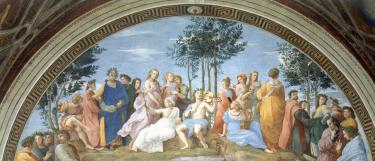
About us
By a quirk of history and the German system, the so-called Faculty of Philosophy at Heidelberg University, despite its name, does not only concern itself with the discipline of philosophy. That task is the business of the Department of Philosophy (Philosophisches Seminar) within the Faculty. Rather, for historical reasons, “Faculty of Philosophy” is the name of a faculty that deals with a number of disciplines which, in other universities, are found in faculties of Humanities.
The name is the product of a long history. In fact, the Faculty of Philosophy is one of four original faculties in Heidelberg. When the university was founded in 1386, the faculty was originally called artes liberales or "liberal arts". In a much more recent chapter in our history, the Humanities disciplines were divided into two faculties: Philosophy, and “Modern Languages” (the Neuphilologische Fakultät). Of these two faculties, the Faculty of Philosophy tends to cover more ancient, classical and historical areas of study, and the study of non-Western cultures.
Themes and Methods
The institutes and disciplines gathered under the banner of the Faculty of Philosophy cover an extremely wide range of cultural developments in the history of humanity, ranging from the earliest traces of human culture to the present day. Thematic foci include the philosophy, history, cultures and languages of Europe, the Near East, South and East Asia, and North America.
The Faculty of Philosophy brings together three main sets of methodological approaches to these fields of study:
Archaeology
the excavation, analysis and interpretation of archaeological evidence (such as architecture, art, and material cultural objects); research on spaces of human settlement, and the long-term dynamics of the relation between humans and the environment (settlement archaeology, geomorphology).
Languages and Texts
documentation and research on individual languages and dialects (e.g. Indian languages, Arabic dialects); comparative and historical linguistics; the composition of editions, commentaries, and analyses of literary and non-literary texts; study of the history, content, and nature of textual traditions as a major and (often) long-standing part of human cultural heritage; ongoing development of philological method.
Philosophy, Culture and History
the evaluation of linguistic and material evidence in research on the full spectrum of political and social organisation and history; literature, art, music; philosophy and the history of ideas; ideology, religion, mythology, and folklore; the history of economy, technology, and sciences; reception studies.
Organization
The Faculty is organised into the Centre for European Historical and Cultural Studies (ZEGK), the Centre for Studies of the Ancient World (ZAW), the Centre for East Asian Studies (ZO), the Department of Languages and Cultures of the Near East (SSKVO), the Department of Philosophy (PS), and the Department of Classical Philology. In addition, the Faculty includes three professorships in the South Asia Institute (SAI). Four additional professorships are housed in the Heidelberg Centre for Transcultural Studies (HCTS): Global Art History, Intellectual History, Cultural Economic History and Buddhist Studies. The Faculty is also part of the Heidelberg Center for American Studies, in the form of the Curt Engelhorn Chair in American History. Two further professorships in the Faculty attach to the Heidelberg Center for Cultural Heritage: the Professorship in Cultural Heritage and Preservation of Cultural Assets, and the Startup Professorship for Cultural Heritage.
Committees
The most important decision-making body in the Faculty is the Plenary Faculty Council. The Council is advised in matters of study and teaching by the Academic Commission , which in its turn is supported by the Curriculum Committees of the various institutes and disciplines.
The management of the Faculty is undertaken by the Dean, with the assistance of the Vice Deans and the Dean of Studies. Together, this group comprises the Faculty Board. Their work is achieved through the Dean's Office.
Examinations in most courses of study are the responsibility of the Examinations Committee, which can be reached via the Joint Examinations Office.
